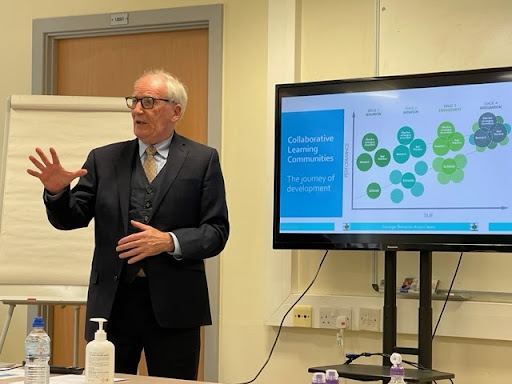Think Pieces
A checklist for the new educational landscape

As schools return to normality, circumstances around teaching are changing, and a degree of flexibility is required.
Schools in our global community are still dealing with Covid to varying degrees but, the draconian responses introduced this time last year have not had to be replicated, and we hope it stays that way.
As a result, most of our colleagues are in the process of, or planning to, redirect some of their energies in their collaborative learning communities away from solely focusing on health and safety and home-schooling to improving the quality of the education they provide for students whilst they are in their school.
With that in mind, we have compiled a checklist to assist school leaders, highlighting potential areas of action they might consider in these circumstances.
It’s not over yet
The continuing impact of Covid and our response to it is likely to be a major concern to us for sometime to come. As this is about the health and safety within our communities, it remains the first issue we deal with. Also, with it being a legal requirement, we refer to this as a system rather than a systemic issue.
Who does what and who ensures they do it?
Once the issues of health and safety are addressed, we can begin to consider other issues. The first is to reaffirm the delegation of responsibility. This identifies who is responsible for resolving a given issue and who is responsible for ensuring that they do so. It is worth remembering that in order to develop moral capital, responsibility is identified through a clear framework of roles, responsibilities and expectations. In practice in given situations it is also linked to the degree of commonality that an issue impacts upon. This approach states that the more common a problem or issue is, the higher it moves up the responsibility hierarchy. So the ownership of a whole school issue is the responsibility of the headteacher, whilst the issue in one class only is that of the specific classroom teacher.
Ensure the theory of action is being carried out
The next area to consider is the role leaders play in ensuring that the school is operating an effective theory of action. Their role in doing this is to:
- Review the validity of what we are trying to achieve (the school’s espoused theory) and the judgement and the process for determining where we are now. As most of our education systems have made modifications to their public examinations (their espoused theory) these need to be understood and shared with staff and students alike.
- In addition to changes to the public examinations, in the light of the ‘new-normal’ the key areas of activity in the school – teaching and learning, leadership and management and collaborative learning – and the behaviours these underpin will also need to be reviewed. They should do this by making expectations clear and encouraging staff to select the appropriate learning activity including role modelling to change behaviours were required. If necessary, they should look at their own role modelling as an effective collaborative learner and make any necessary adjustments.
- Provide the opportunity for staff to reflect on their actions, what determined them and then by making them explicit to their colleagues share their learning with each other – (providing opportunities for single and double loop learning). In that way their next actions reflect their own and their colleagues’ knowledge and they do not get locked into repeating the same flawed action repeatedly.
Check that the conditions for collaborative learning are in place
Carry out a four capitals audit with a particular focus on moral capital so the bedrock of the collaborative learning community is secure. Consider the security of the culture they have helped to create to achieve this and if necessary, police the edges.
Re-visit the learnt non-negotiable and degrees of variance they use to define the actions they take and consider in light of new evidence if they need updating and ensure they are being universally implemented.
Take care of yourself
Finally, remember we are coming out of abnormal times so accept that you cannot do all of the above at once and prioritise your actions, working from the highest impact on your student and staff learning with the least effort to the reverse. Then make sure you take a little time to look after your own and those who care for your well-being.
We are grateful to David Cotton, CEO, David Vernon, Executive Principal, and the remainder of the executive team at the Diverse Academies, Multi Academies Trust, Retford, England helping us to shape these questions. They emerged from the workshop we were invited to hold on introducing an effective knowledge management approach to school improvement.
I am sure we will hear more from the Trust in the future, as they continue to refine their theory of action from the evidence of the impact of their collaboratively learning approach to school improvement on the life chances of their students.
George

